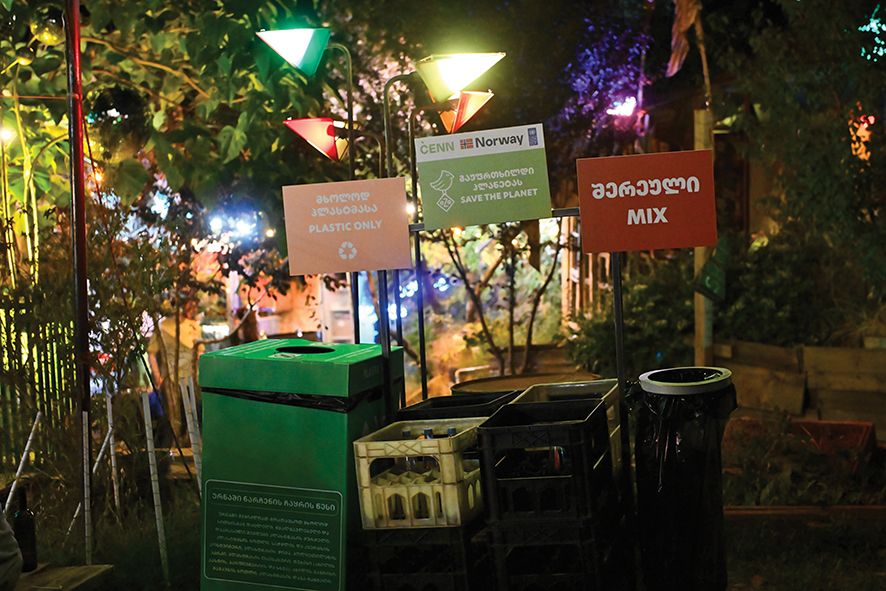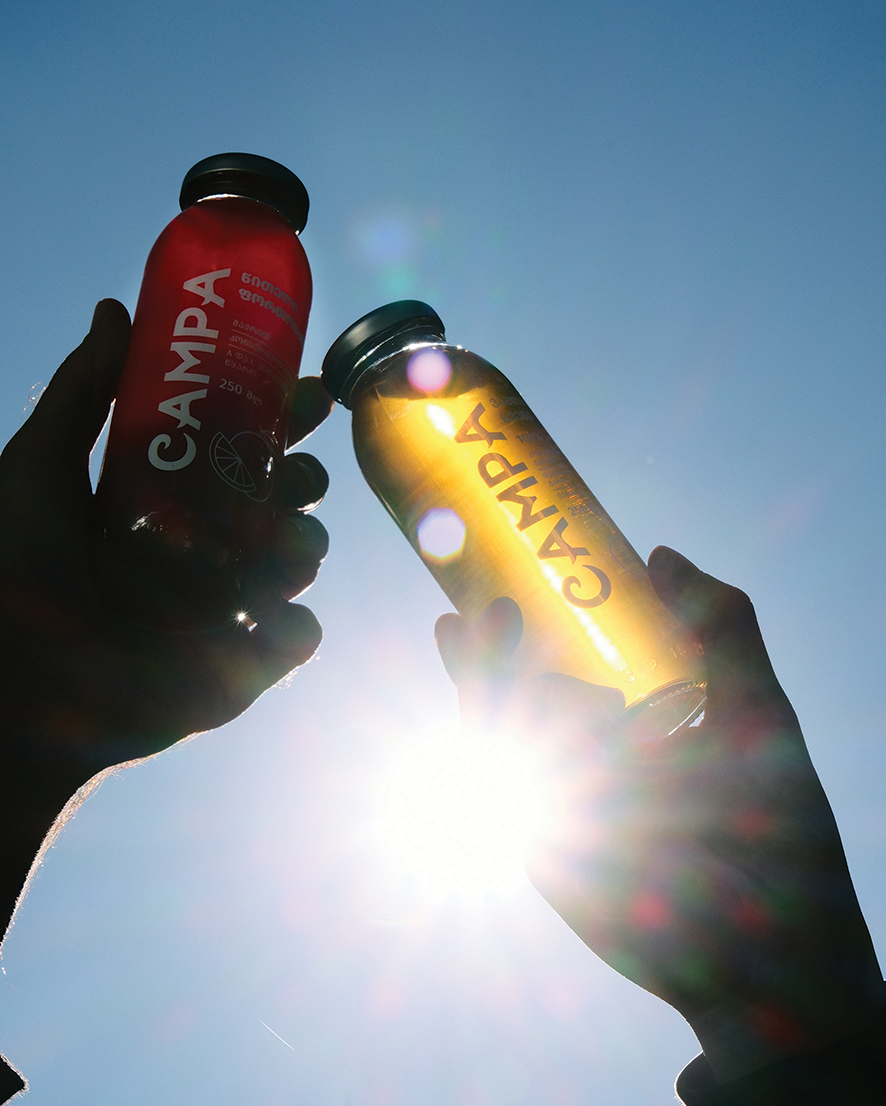As environmental concerns reach critical levels, the need for sustainable business practices has never been more urgent. In response, the Tbilisi Circular Labs (TCL), an innovative initiative supported by GIZ, is transforming the landscape of sustainability in Georgia. This project is part of the broader global effort known as “Circular City Labs,” which focuses on reducing greenhouse gas (GHG) emissions while promoting economic viability and inclusivity, particularly for women entrepreneurs. By fostering a system where packaging can be returned, cleaned, and reused, TCL is poised to redefine sustainable practices in Tbilisi and beyond.
Through this initiative, businesses are not only addressing waste management but also discovering new opportunities for growth in an increasingly eco-conscious market. In this article, Ana Chkhetia from Campa, Salome Kuprashvili from Fabrika, and Sopo Donadze from Ezo Festival share their insights as representatives of their companies. We explore the benefits of reuse systems, highlight GIZ’s initiatives in Georgia, and examine the growing focus on sustainability.

The Vision of TCL
The Circular City Lab initiative envisions the establishment of labs in four global cities, including Tbilisi, where businesses, city administrations, academia, and civil society collaborate to develop functional and inclusive circular economies. The primary goal is to explore the potential of reusable packaging systems that not only benefit the environment, but also empower local communities, especially women. The TCL project is implemented by the Caucasus Environmental NGO Network (CENN) in partnership with GIZ and ICLEI – Local Governments for Sustainability.
The Tbilisi Circular Lab initiative represents a significant shift in how businesses view sustainability. By focusing on reusable packaging systems, the project addresses two critical challenges: reducing waste and enhancing the economic viability of businesses in Georgia.
In the context of Georgia, where the concept of a circular economy is still relatively new, GIZ’s involvement has been crucial in guiding businesses through this transition. According to Mariam Chkheidze, Advisor for Sustainable Urban Development at GIZ, “Georgia has a unique opportunity to lead by example in the region when it comes to circular economy practices. With the support of local partners like CENN, GIZ aims to integrate circularity into the business model of Georgian SMEs, helping them to not only reduce waste but also improve their profitability and long-term sustainability.”
The Benefits of Reuse Systems in Business
Implementing reuse systems offers a myriad of advantages for businesses, extending beyond just environmental benefits. “Adopting reusable packaging is a strategic move,” asserts Nana Takvarelia, Circular Economy and Waste Management Specialist at CENN. “It not only significantly reduces waste, but also reduces demand on raw materials (I.e. natural resources) and lowers costs associated with purchasing single-use products. This can lead to long-term financial savings for businesses.”
Local businesses participating in the TCL initiative have already begun to recognize the positive impact this shift could bring. Fabrika, a cultural hub in Tbilisi, will be among the first to adopt a reusable cup system with a deposit mechanism in their cafes next year. “We’re experiencing increased customer loyalty simply by prioritizing sustainability,” states the representative from Fabrika. “Our visitors care about their ecological footprint, and when they see us making these changes, it resonates with them.”

For Campa, a leading juice producer in Georgia, sustainability is about reducing waste at every level of production. “We are committed to minimizing our environmental footprint by introducing bottle return systems,” says a Campa representative. “This initiative will allow us to reuse glass bottles, significantly reducing the need for new resources and lowering waste.”
Ezo Festival, a prominent festival, is also participating in the circular economy push. “We’ve already begun replacing single-use plastic bottles with reusable alternatives,” states a festival representative. “Next, we will be replacing single-use cups with reusable alternatives. We want to minimize plastic waste and educate our audience about the importance of sustainability. Our goal is to lead by example.”
Global Vision & Circular Economy
GIZ is a global leader in promoting sustainable development, and its Circular City Labs project plays a pivotal role in advancing the concept of circular economies in multiple countries. “Circularity is one of the key aspects of an environmentally sustainable economy,” explains Mariam Chkheidze. “We believe in developing tailored approaches that meet the specific needs of each country, ensuring maximum effectiveness. Our work in Georgia is part of this broader initiative to create a positive environmental and economic impact.”
The Circular City Labs initiative is currently being implemented in four countries: Colombia, Albania, Georgia, and South Africa. While the core objectives of the project remain the same across all locations, each country has a unique context, and GIZ works closely with local partners to adapt the program to the specific needs of each region.
“We view Georgia as a key player in this effort,” Chkheidze continues. “By collaborating with local stakeholders and supporting businesses like Fabrika, Campa, and Ezo Festival, we are creating a model for circular economy practices that can inspire other businesses in the region. This initiative aligns with GIZ’s overall mission to reduce greenhouse gas emissions and promote economic inclusivity, particularly for women entrepreneurs.”
Grant Competition Development
A critical component of the TCL initiative is the grant competition designed to identify the most promising business ideas that promote circularity. Once TCL was established, CENN mobilized businesses from various industries, who have direct involvement in packaging and had a strong interest in sustainability. Initially, 14 businesses (small, medium, and large), some collaborating on joint ideas, joined TCL. These businesses worked alongside CENN experts and business development professionals to explore their potential for implementing packaging return and reuse systems, evaluate existing infrastructure, and identify resource optimization opportunities.
Following this, a grant competition was launched among TCL members. Winners were selected to participate in a business acceleration program developed by CENN. As part of this program, the three winning TCL members—Ezo Festival, Fabrika, and Campa—were paired with international industry experts from GIZ, local business development specialists, and CENN’s circular economy experts. This collaboration provided them with tailored guidance to strengthen their circular business model.
“We brought in international experts and entrepreneurs to provide guidance,” Chkheidze says. “This ensured that the businesses not only received funding, but also developed a solid understanding of how to successfully implement reuse systems.”
The competition process was rigorous, with applicants being evaluated based on the sustainability and scalability of their projects. As Nana Takvarelia explains, “All businesses had a strong vision and, after working closely with them, they were able to develop financially and operationally viable business plans that incorporate packaging return and reuse systems. Together we identified most optimal opportunities that lead to resource-efficiency, profitability and significant reduction in environmental impact.”

The Grant Competition: Selection Criteria and Winners
The selection process for the grant competition considered several factors beyond just the business potential of the ideas. The sustainability of the proposed projects was a key criterion. “We were looking for projects that would not only be successful in the short term, but also be sustainable beyond the grant and go further once pilot systems were tested and established,” Takvarelia explains.
The winners—Fabrika, Campa, and Ezo Festival—stood out for their innovative proposals and commitment to sustainability. Each business presented a detailed plan for implementing a reusable packaging system that could significantly reduce waste in their operations.
For example, Fabrika’s plan to replace disposable cups with reusable ones in their cafes is not just about reducing waste, it’s about creating a culture of sustainability among their customers. “This is a cultural shift,” says a Fabrika representative. “We want our guests to understand that their choices can have a direct impact on the environment.”
Ezo Festival is taking a similar approach, introducing reusable cups for its guests in an effort to minimize plastic waste during its events. “By offering reusable cups, we aim to create a more sustainable festival experience,” a festival representative states. “We know that our audience cares deeply about the environment, and we’re excited to give them an opportunity to be part of this change.”
Campa, which produces juices in both glass and cardboard packaging, is working on establishing a bottle return system. “This is the next logical step for us,” says a Campa representative. “Our customers have been asking about bottle returns for some time, and with the help of CENN and GIZ, we’re now able to make this a reality.”
Looking Ahead: The Future of Circular Economy in Georgia
The success of these projects has the potential to drive a broader shift toward circular economy practices in Georgia. GIZ’s Mariam Chkheidze notes that the growing consumer demand for sustainable products will play a key role in this transition. “We believe that customers will respond positively to these initiatives,” she explains. “As awareness grows, we hope to see a domino effect where more businesses adopt circular economy models and sustainable practices.”
The experiences of the pilot projects will be invaluable for refining these models and expanding them across the country. “The lessons learned during the pilot phase will help us understand what works, what challenges exist, and how we can further support businesses in Georgia,” says Chkheidze. “This knowledge will be shared with the broader community, creating an ecosystem where circular economy practices are embraced by more and more businesses.”
CENN, in collaboration with GIZ, plans to monitor the progress of the current pilot projects closely, with the aim of scaling up successful models. “We are committed to ensuring that these projects not only succeed but also become models for other businesses,” Takvarelia notes. “These pilots will create a precedence on the Georgian market and will generate information and data that can later be used and applied to other businesses and instances. It will also help us guide the country on a right path to circular policy development, which can be based on existing local needs. The future of Georgia’s circular economy will depend on how well we can integrate these practices into everyday business operations.”
The Tbilisi Circular Labs initiative represents a significant leap forward in integrating sustainable practices within Georgia’s business community. Through collaboration with GIZ and CENN, local businesses are not only embracing reuse systems but are also setting a precedent for a circular economy in the region. As Fabrika, Ezo Festival, and Campa lead the way, they exemplify the transformative power of sustainable innovation.
The support provided by GIZ, combined with CENN’s expertise and the dedication of Georgia’s entrepreneurs, is helping to create a foundation for a circular economy that can thrive in Georgia and beyond. As Takvarelia succinctly puts it, “This is about creating a legacy of sustainability for future generations.” With continued collaboration and dedication, Georgia is poised to become a model for circular economy practices in the Caucasus region and beyond, paving the way for a greener, more sustainable future.
By Kesaria Katcharava














